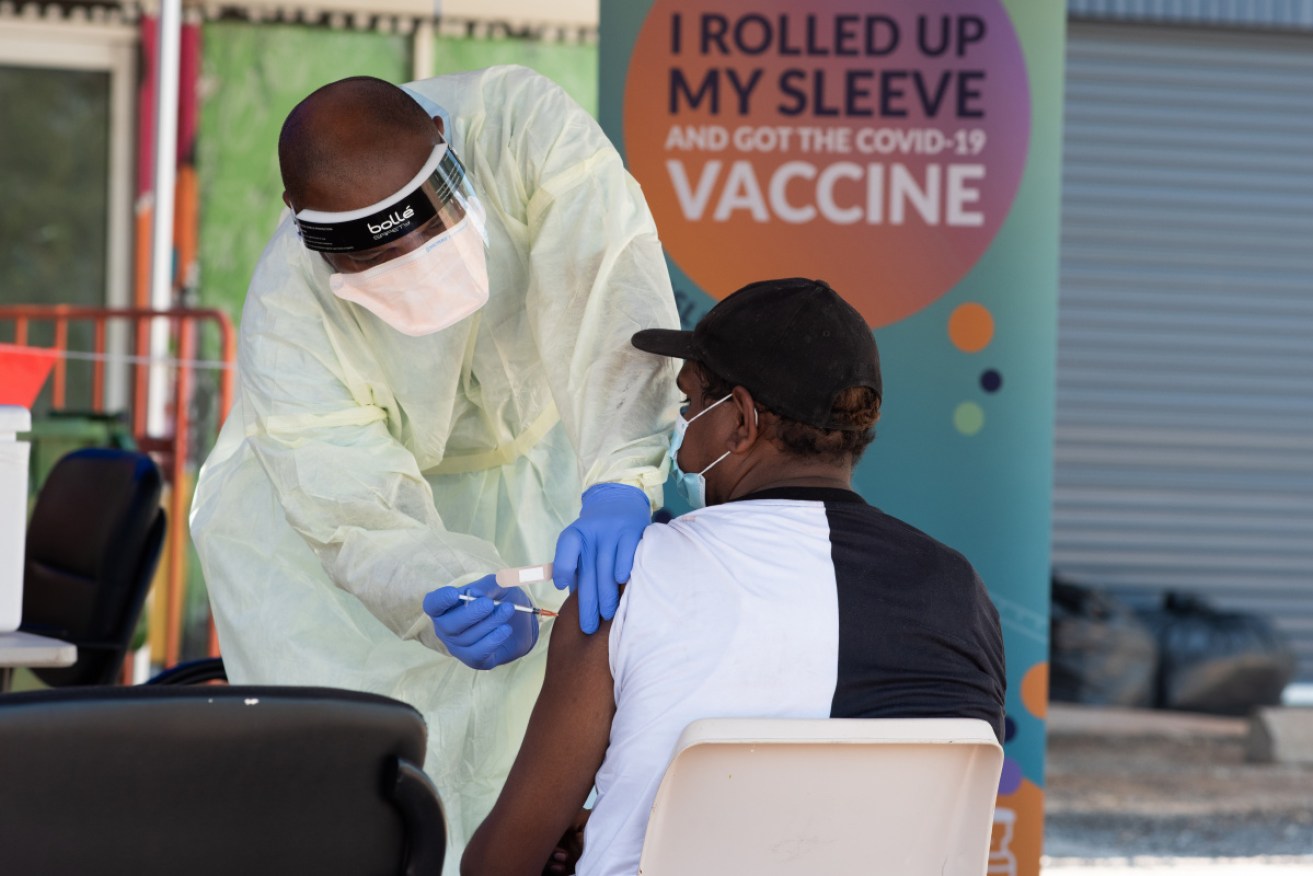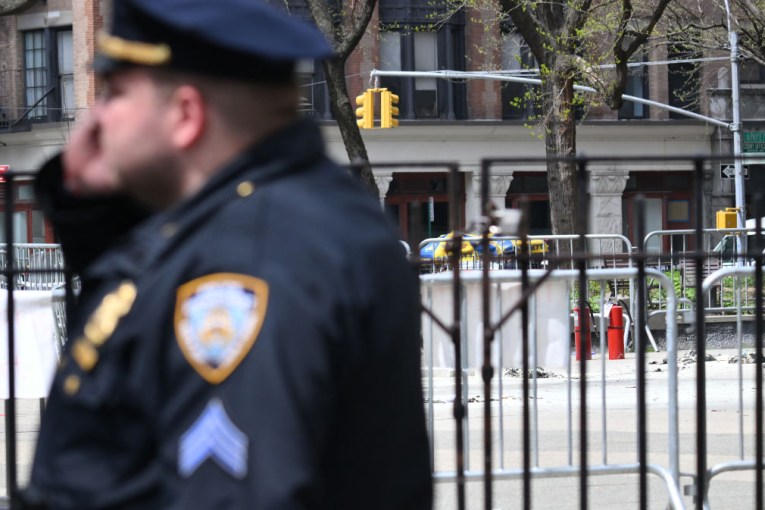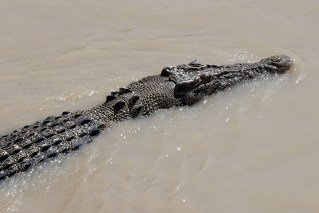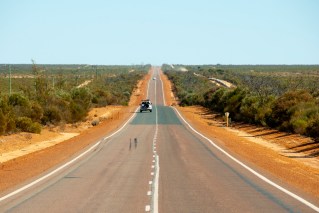COVID: National cabinet to discuss mask rules, Christmas travel as WHO issues Omicron warning


Australians may require three doses to be considered fully vaccinated in future. Photo: AAP
Australian leaders will hold an emergency meeting about the Omicron coronavirus variant and discuss whether people will soon need three jabs to be called fully vaccinated.
They are also considering rules about masks and travel restrictions over Christmas.
The World Health Organisation has recommended some countries grappling with a surge in cases should delay or cancel Christmas events to stop the spread of Omicron which it says is “spreading significantly faster” than Delta.
Early on Tuesday morning, Buckingham Palace sources confirmed Queen Elizabeth has cancelled her Christmas plans due to concerns over the growing number of coronavirus cases.
“An event cancelled is better than a life cancelled,” WHO director-general Tedros Adhanom Ghebreyesus said.
Meanwhile, Moderna has said that its vaccine appears to be effective against the new variant.
There is more on all of that, below.
The other big coronavirus news making headlines around the world is that Spanish tennis ace Rafael Nadal confirmed he has tested positive for COVID-19.
Here’s what you need to know.
- Read more: Calls to make rapid antigen tests free
National cabinet considers Christmas rules
Prime Minister Scott Morrison will convene an “informal” national cabinet in a virtual meeting with state and territory heads on Wednesday to discuss the threat of the new Omicron variant.
He is due to update the first ministers with the most recent information on Omicron and urge them to stay calm and provide consistent border arrangements ahead of the holidays.
The time frame of booster shots is due to be discussed, with South Australia pushing for a shortened interval amid Omicron concerns.
Nine newspapers reported Australia’s vaccine advisory body, ATAGI, is reviewing whether three doses will be required to be considered fully immunised.
Chief Medical Officer Dr Paul Kelly has also reportedly recommended “minimal to moderate restrictions” including a mask mandate in all indoor settings in an effort to curb an escalation in Omicron cases.
“Masks should be mandated in all indoor settings including retail, hospitality when not eating or drinking, and entertainment facilities,” advice from Dr Kelly reads, according to The Sydney Morning Herald and The Age.
“Implementation of mask-wearing measures should occur prior to Omicron case escalation to have maximum benefit.”
When speaking to reporters on Monday, Mr Morrison said the government would follow health advice on mask mandates, with there being some circumstances where mask wearing was “common sense”.
NSW Premier Dominic Perrottet has resisted a push to reintroduce a mask mandate as cases in the state soared to record levels over the past week.
Omicron infecting the vaccinated
The Omicron variant of the coronavirus is spreading faster than the Delta variant and is causing infections in people already vaccinated or who have recovered from the COVID-19 disease, the head of the World Health Organisation says.
“There is now consistent evidence that Omicron is spreading significantly faster than the Delta variant,” WHO director-general Tedros Adhanom Ghebreyesus said early on Tuesday morning.
“And it is more likely people vaccinated or recovered from COVID-19 could be infected or re-infected.”
Tweet from @Quicktake
WHO chief scientist Soumya Swaminathan said that the variant was successfully evading some immune responses, meaning that the booster programmes being rolled out in many countries ought to be targeted towards people with weaker immune systems.
Omicron appears to be better at evading antibodies generated by some COVID-19 vaccines but there are other forms of immunity that may prevent infection and disease, WHO officials said.
“We do not believe that all vaccines will become completely ineffective,” Dr Swaminathan said.
WHO expert Abdi Mahamud added: “Although we are seeing a reduction in the neutralisation antibodies, almost all data shows T-cells remain intact, that is what we really require.”
While the antibody defences from some courses have been undermined, there been hope that T-cells, the second pillar of an immune response, can prevent severe disease by attacking infected human cells.
Dr Swaminathan, referring to a treatment for people with the disease, said: “Of course there is a challenge, many of the monoclonals will not work with Omicron.” She gave no details.
But the WHO team also offered some hope to a world facing the new wave that 2022 would be the year that the pandemic, which already killed more than 5.6 million people worldwide, would end – with the development of second and third generation vaccines, further development of antimicrobial treatments and other innovations.
“(We) hope to consign this disease of a relatively mild disease that is easily prevented, that is easily treated …and that able to cope easily with this disease into the future,” Mike Ryan, the WHO’s top emergency expert, told the briefing.
“If we can keep virus transmission to minimum, then can bring pandemic to end.”
Moderna says vaccine fights Omicron
Moderna says a booster dose of its COVID-19 vaccine appears to protect against the fast-spreading Omicron variant in laboratory tests and the current version of the vaccine will continue to be Moderna’s “first line of defence against Omicron”.
The vaccine maker said the decision to focus on the current vaccine, mRNA-1273, was driven in part by how quickly the recently discovered variant is spreading.
The company still plans to develop a vaccine specifically to protect against Omicron, which it hopes to advance into clinical trials early next year.
“What we have available right now is 1273,” Dr Paul Burton, Moderna’s chief medical officer, said in an interview.
“It’s highly effective, and it’s extremely safe. I think it will protect people through the coming holiday period and through these winter months, when we’re going to see the most severe pressure of Omicron.”
The company said a two-dose course of its vaccine generated low neutralising antibodies against the Omicron variant, but a 50 microgram booster dose increased neutralising antibodies against the variant 37 fold.
A higher, 100 microgram booster dose of the same vaccine drove antibody levels even higher – more than 80 times pre-boost levels.
The data, which has not yet been peer reviewed, tested blood from people who had received the vaccine against a pseudovirus engineered to resemble the Omicron variant.
It is similar to data discussed last by top US infectious disease expert Anthony Fauci.
Dr Burton said it would be up to governments and regulators to gauge whether they want the enhanced level of protection that a 100 microgram dose might confer.
The company said that the 100 microgram dose was generally safe and well tolerated, although there was a trend toward slightly more frequent adverse reactions.
Moderna also tested the vaccine’s effectiveness compared to its prototype boosters that target multiple previous variants of concern, and said the results were similar.
US regulators authorised the 50 microgram booster of Moderna’s vaccine in October.
The first two shots of Moderna’s vaccine are both 100 micrograms.
Both the Moderna and the Pfizer/BioNTech vaccines have been linked to rare cases of heart inflammation, particularly in young men.
Several studies have suggested that Moderna’s vaccine is likely to cause the heart inflammation at a higher rate.
Rafael Nadal may miss Australian Open
Rafael Nadal has revealed he tested positive for COVID-19 upon arrival in Spain after making his comeback from injury in the Mubadala World Tennis Championship exhibition event in Abu Dhabi last week.
The 20-time grand slam champion said he was having some “unpleasant moments” but was hoping to feel better soon and would keep people informed about his plans over future tournaments.
“I wanted to announce that on my return home after playing the Abu Dhabi tournament, I have tested positive for COVID in the PCR test that has been performed on me when I arrived in Spain,” Nadal posted on Twitter.
Tweet from @RafaelNadal
The 35-year-old said he had tested negative at all times when he was in Kuwait and Abu Dhabi, and had last tested negative on Friday last week.
The Spaniard’s comeback from injury at the exhibition event – his first tournament appearance since the Citi Open in Washington in August – ended in two close defeats by Andy Murray and Denis Shapovalov.
“I am having some unpleasant moments, but I hope that I will improve little by little. I am now homebound and have reported the result to those who have been in contact with me,” he wrote.
“As a result of the situation I have to have total flexibility with my calendar and I will analyse my options depending on my evolution. I will keep you informed of any decisions about my future tournaments.”
Nadal spent four months on the sidelines with a foot injury.
He was knocked out at Roland Garros in the semi-finals and was forced to pull out of Wimbledon, the Tokyo Olympics and the US.Open.
He had said he could not guarantee he would make the trip for the Australian Open which begins on January 17.
-with wires








